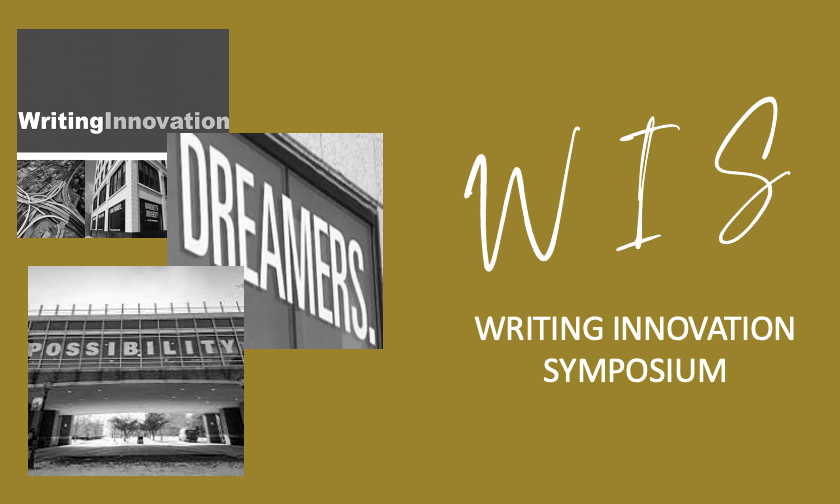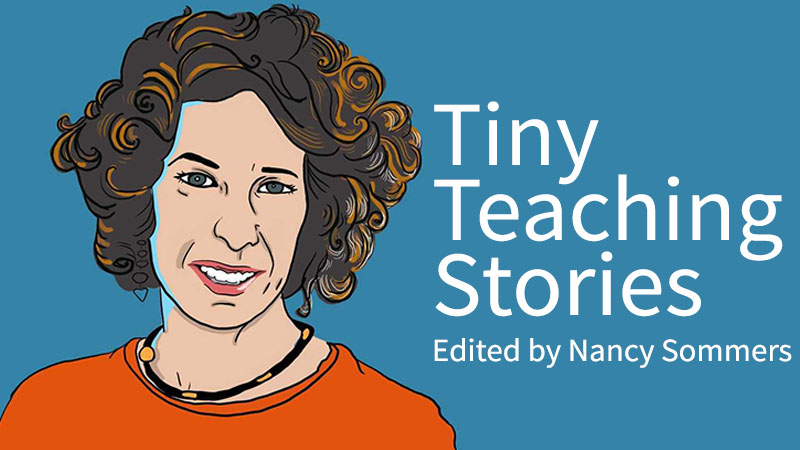-
About
Our Story
back- Our Mission
- Our Leadershio
- Accessibility
- Careers
- Diversity, Equity, Inclusion
- Learning Science
- Sustainability
Our Solutions
back
-
Community
Community
back- Newsroom
- Webinars on Demand
- Digital Community
- The Institute at Macmillan Learning
- English Community
- Psychology Community
- History Community
- Communication Community
- College Success Community
- Economics Community
- Institutional Solutions Community
- Nutrition Community
- Lab Solutions Community
- STEM Community
- Newsroom
- Macmillan Community
- :
- English Community
- :
- Bits Blog
- :
- Bits Blog - Page 3
Bits Blog - Page 3
Options
- Mark all as New
- Mark all as Read
- Float this item to the top
- Subscribe
- Bookmark
- Subscribe to RSS Feed
Bits Blog - Page 3
Showing articles with label Developmental English.
Show all articles
Author
01-09-2019
11:05 AM
The last three assignments in the Incubator series of assignments that I have designed for my technical writing courses are directly related to one another. Students write a Short Proposal for the White Paper and the Research Poster projects that they will complete during the second half of the term. In today’s post, I will share this proposal with you.
Because I want them to focus their energy on the major report (the white paper), I ask for a short, memo-based proposal, rather than a longer document. The topic proposal assignment gives students very specific guidelines to follow so that the more in-depth coverage from the textbook does not lead them to do more than they need to. My underlying goal for the activity is two-fold: I want them to learn how to write a research proposal, but just as importantly, I want to spot-check their topics for the white paper and research poster before they get too far into the project.
As with previous assignments in this series, the proposal assignment below is an example that has some minor changes to remove specific information that is relevant only to the students in my classes. References to “Markel & Selber” in the assignment refer to chapters in the class textbook Technical Communication by Mike Markel and Stuart Selber.
Technical Writing Proposal Assignment
Background
You will write a short proposal that presents the topic you will explore for your white paper and poster presentation. Your proposal should explain not only what the topic is but how it relates to your company (and therefore your career field and major) and the incubator goal of public outreach and education.
The Scenario
Today, you received the following memo, asking you to submit a proposal for a white paper and related poster presentation:
Ut Prosim Incubator
1872 Inventors Way, Blacksburg, Virginia 24060
Interoffice Memo
To: All Incubator Companies
From: Traci Gardner, Ut Prosim Director
Subject: RFP: White Papers and Poster Presentations for December Publication
Date: October 1, 2018
Our Public Outreach Office is requesting proposals for white papers and research posters that will inform non-expert readers about a technical topic relevant to the work and mission of your company. These documents will share what we do and why we do it with the university, alumni, and local community. Your documents will also contribute directly to our goal of public outreach and education by adding to our growing library of documents that inform website readers about how science, technology, and engineering work.
As an objective white paper, accepted documents will either provide knowledge or information about a subject relevant to your company or provide solutions to a problem or challenge that relates to your company—or even a combination of both goals. These white papers will also be the basis of a presentation that will be part of the quarterly poster session we sponsor for the local community in December. As an extension, additional investors and clients also attend the session, so you have the potential to make critical connections for your business.
These white papers and poster presentations are due by November 26 [Portfolio 2 due date] and will be published in the December 2018 release on the Incubator website.
White Paper Expectations
Length: 25 pages or less.
Document Design: Polished, professional layout that relies on design strategies that increase the document’s readability. You are encouraged to use a non-traditional format that incorporates sidebars, columns, and other visually-interesting design strategies. Please do not include a cover page.
Graphics and Visual Elements: Include relevant graphical elements (e.g., photos, illustrations, graphs, tables). All graphical elements must be your company’s intellectual property, or you must provide complete documentation. Graphical elements that are not your own intellectual property must meet fair use guidelines.
Research Support: Information must be supported by fully-documented research, including relevant quotations. In addition to citing published research studies, you can take advantage of the campus community by tapping university experts on the topic you are discussing.
Documentation Format: APA citation style (or the appropriate style for your field, if desired—for instance, an electrical engineer can use IEEE).
Submission Format: *.doc, *docx, *.pdf, or Google Document link.
Additional criteria and examples will be provided once proposals are accepted.
Poster Presentation Expectations
Size: 48" X 36", presented in landscape orientation (horizontal).
Document Design: Polished, professional layout that relies on design strategies that increase the document’s readability. Must use appropriately-sized headings, text, and images.
Graphics and Visual Elements: Include as many relevant graphical elements (e.g., photos, illustrations, graphs, tables) as necessary to present your ideas. All graphical elements must be your company’s intellectual property, or you must provide complete documentation. Graphical elements that are not your own intellectual property must meet fair use guidelines.
Research Support: Information must be supported by fully-documented research, including short, relevant quotations. In addition to citing published research studies, you can take advantage of the campus community by tapping university experts on the topic you are discussing.
Documentation Format: APA citation style (or the appropriate style for your field, if desired—for instance, an electrical engineer can use IEEE).
Submission Format: *.ppt, *pptx, or Google Slides link.
Additional criteria and examples will be provided once proposals are accepted.
Proposal Requirements
Your proposal should be in memo format, be no more than four pages in length, and provide the following information to help us gauge the appropriateness of the topic for December publication:
Background (or Introduction) Give some background on your topic, your experiences with it to date, what you already know, etc. Then clearly state, “[We, OR your company name, OR similar] would like to produce a white paper and poster presentation on [your topic] for the following reasons: . . . .” In your statement, explain your motivations for sharing information about the topic with the public.
Areas to be Studied Provide more details on the proposed topic for your white paper and poster presentation so that the Public Outreach Office understands the approach you will take. Consider the following questions:
What are the key points you will explore or explain?
What are some questions you will ask and try to answer in this white paper and poster presentation?
How do the areas to be studied relate to your company’s mission?
What ethical and/or intercultural and global issues will you consider as you examine the topic you have chosen?
Methods of Research Explain how you will gather the information that you present in your white paper and poster presentation. Tell the Public Outreach Office your research strategy by outlining exactly how are you planning to gather information and find answers to your questions explored in the white paper and poster presentation.
Timetable Share a calendar that includes the target dates for various milestones that will lead to completion of your white paper and poster presentation. Be sure that your schedule allows you to finish by the white paper and poster presentation due date, November 26 [Portfolio 2 due date].
Qualifications Explain why you are qualified to do this research and outline the skills you have that will help you deal with this topic effectively.
Request for Approval Ask for approval; ask for guidance, articulate your biggest concerns at this point; ask for suggestions about next right steps; provide contact information.
Due Dates
October 8, 2018: Proposal submitted as a memo, addressed to me and to Manolito Reyna Bautista, Manager of the Public Outreach Office
November 26, 2018: Finished White Paper and Poster submitted [in Canvas, as part of Portfolio 2]
Any Questions?
If you need any help with your proposal, please let me know or contact my assistant, Leslie Crow <lcrow@utprosimincubator.org>.
Relevant Details
Note: These details apply to all of the projects you include in your portfolio.
Your company’s address is [Your Company Name], Ut Prosim Incubator, 1872 Inventors Way, Suite #[you choose a number], Blacksburg, Virginia 24060. Your company’s phone number is 540-555-5555. You may create a fictional Internet domain for your company, and use that domain for a web page address and your email addresses. If you’d like, you may create other information (including a logo) for your company as appropriate. Be sure that you use the information that you create consistently across all of your projects.
The Project Assignment
Step 1: Decide on the focus for your white paper and poster presentation(which you will write as future projects). Your focus will be to inform non-expert readers about a technical topic that is related to your company (and therefore, related to your career field and major). Try to limit yourself to topics with which you have some expertise (or at least some experience) to simplify the research process. These example white papers may help you think of appropriate topics and/or approaches:
White Paper on Studying the Safety of the Childhood Immunization Schedule (CDC)
The Flint Water Crisis and Its Health Consequences (AccessScience)
Funding Trees for Health (The Nature Conservancy)
Microsoft Password Guidance (MSFT)
The Model of Good Health (ASME)
Step 2: Examine the information about proposals in Markel & Selber. The textbook provides complete details on how to write proposals. Follow the textbook as you work on your project. In particular, be sure that you do the following:
Follow the “GUIDELINES: Demonstrating Your Professionalism in a Proposal” (starting on page 430 of Markel & Selber) to ensure you adopt the appropriate tone.
Use the “ETHICS NOTE: WRITING HONEST PROPOSALS” (starting on page 430 of Markel & Selber) to make your proposal professionally acceptable.
Work through the “GUIDELINES: Introducing a Proposal” (starting on page 432 of Markel & Selber) to gather information for your proposal’s Background section.
Explore the information in the “Tech Tip: Why and How to Create a Gantt Chart” (starting on page 436 of Markel & Selber) to see an effective strategy for explaining your timetable.
Step 3: Write the proposals for your white paper and poster presentation. Compose your proposal, as requested in The Scenario above, with all the details you have gathered. Review the assessment guidelines below to ensure you have met all the requirements for the proposal. As you work, also keep the following points in mind:
Use plain language to make the ideas in your proposal are easy to find and read. Refer to the resources from Module 2 as needed.
Follow all relevant ethical guidelines as you work using the Writer’s Checklist at the end of Chapter 2 (on page 40 of Markel & Selber).
Follow the suggestions for emphasizing important information, using the Writer’s Checklist for Chapter 9 (on page 211 of Markel & Selber) to check your work.
Use the Writer’s Checklist for Chapter 11 (on page 288 of Markel & Selber) to ensure that your document takes advantage of design principles to make it reader-friendly.
Make a good impression with accuracy and correctness. Your document should be polished and professional.
Step 4: Check your draft against the Writer’s Checklist. Be sure that you include the required features for instructions. Review your project, using the Writer's Checklist for Chapter 16 (on page 439 of Markel & Selber) and the Assessment Criteria below.
Step 5: Review your draft for design and basic writing errors. Everything you write should use accurate/appropriate image editing, grammar, spelling, punctuation, mechanics, linking, and formatting. These are important basic writing skills that you should have developed in high school. Review your project, using the Writer’s Checklist at the end of Markel & Selber, Chapter 10 (on page 242 of Markel & Selber).
You can also consult the information on “Sentence-Level Issues” in Markel & Selber, “Appendix, Part 😧 Guidelines for Multilingual Writers (ESL)” (on page 683 of Markel & Selber). While the section is labeled for multilingual writers, it is useful for everyone. It includes explanations and examples for many common mistakes writers make.
Step 6: Submit your draft to your Writing Group in Canvas. Post a rough draft of your Proposal to your Writing Group in Canvas in the 10/04 Draft Feedback Discussion in Canvas. Additional instructions are in the Discussion. If you do not post your draft by noon on Sunday, October 7, your group may not have time to provide feedback.
Step 7: Provide feedback to your Writing Group in Canvas. Provide feedback to the members of your writing group in the 10/04 Draft Feedback Discussion in Canvas, by October 8 (end of the grace period). Use the information on the Writing Groups page to provide constructive feedback that will help your group members make concrete improvements to their drafts. You are not obligated to provide feedback for any drafts posted afternoon on Sunday, October 7.
Step 8: Revise your draft. Use the feedback that you receive from your group members to revise and improve your document. You can share your draft again with your Writing Group if you desire. As you revise, keep in mind the advice in the steps above, as well as the Assessment Criteria below.
Step 9: Include a polished version of your project in Project Portfolio 2, due November 26. Have your Proposal finished and ready for submission in your Project Portfolio 2, which is due Monday, November 26. The grace period for Project Portfolio 1 ends at 11:59PM on Thursday, November 29.
Assessment Criteria
For All Technical Writing Projects
All technical writing projects should meet the following general criteria:
Makes a good first impression as a polished and professional document.
Meets the needs of the intended audience.
Demonstrates how to emphasize important information.
Uses layout and formatting that makes information easy for readers to find and read, and that follows the standards you have set for your company.
Is written in plain language, which communicates the ideas clearly.
Follows all relevant ethical guidelines.
Uses accurate/appropriate grammar, spelling, punctuation, mechanics, linking, and formatting.
For Proposals
Your project should meet the following criteria for effective proposals, based on the checklist at the end of Chapter 16 of Markel & Selber:
Meets the guidelines established in the request for proposals (see The Scenario, above).
Demonstrates professionalism and honesty.
Includes an introduction that indicates the following:
the problem or opportunity.
the purpose of the proposal.
the background of the problem or opportunity.
your sources of information.
the scope of the proposal.
the organization of the proposal.
the key terms that you will use in the proposal.
Provides a clear, specific plan for research and justifies that methodology.
Describes the qualifications and experience clearly outlining
relevant skills and past work.
relevant equipment, facilities, and experience.
Includes full documentation for all ideas, words, and visuals that the work of others (see Part B, “Documenting Your Sources,” in Markel & Selber).
This assignment has gone relatively well. The most frequent issue has been confusion about memo format. Students either didn't follow the instructions and used other formats, or they did not follow the format accurately. The most serious issue that has come up has been a failure to provide enough details and the development of the proposal. I wonder if the emphasis on a “short” proposal has misled some to think that general and underdeveloped ideas were adequate. When I use this activity again, I will work to address both of these issues.
My next post will share the instructions for the white paper, which is the next project students worked on. Be sure to come back to read more about that activity, and in the meantime, if you have any feedback to share, please leave a comment below.
Photo credit: Typing content by Search Engine People Blog on Flickr, used under a CC-BY 2.0 license.
... View more
Labels
-
Composition
-
Developmental English
-
Literature
0
0
15.4K
Topics
-
Bedford New Scholars
42 -
Composition
238 -
Corequisite Composition
33 -
Developmental English
31 -
Events and Conferences
18 -
Instructor Resources
6 -
Literature
40 -
Professional Resources
7 -
Virtual Learning Resources
4
Popular Posts








